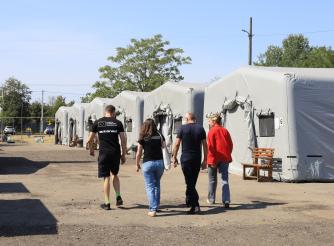"I just wish that the war would end now”: Women in Gaza on the devastating toll of 12 months of crisis
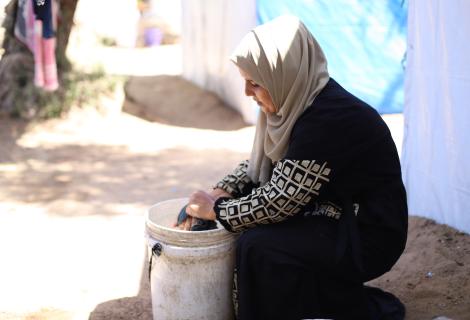
Women in Gaza have told ActionAid of the devastating impact 12 months of war has taken on their lives. A year of constant bombardment by the Israeli military, repeated displacement and limited access to essentials like food, water, and medicine has turned their worlds upside down and left them struggling to survive. Yet even amid such dire circumstances, women are finding ways to support one another and are demonstrating remarkable strength and leadership.
More than 41,000 people have been killed in Gaza over the last year - an average of around 130 people per day – in a war characterised by repeated attacks on protected buildings such as schools and hospitals, which could amount to grave violations of international humanitarian law. Mazouza is one of many women in Gaza who became a widow overnight, after the house she was staying in was bombed, killing her husband. She and her daughter survived after being rescued from the rubble. Speaking from the displaced person’s camp in Nuseirat where she is now living, Mazouza told ActionAid that the violence and brutality of the last year were unprecedented.
“I have witnessed the three wars...but I have never seen a war like this," she said. “They do not spare a child, a man, a young man, or an elderly person.”
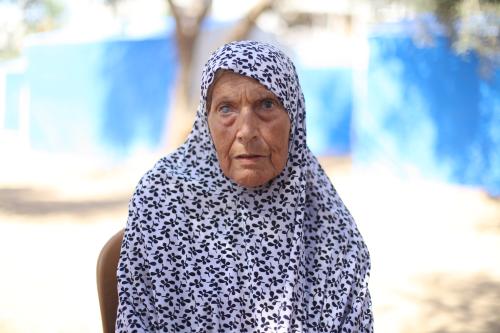
At least nine out of ten people in Gaza have been displaced during the last year, some of them as many as nine or ten times. Shurooq, a 31-year-old mother, describes her intense distress when she and her family were forced to flee their home in northern Gaza, amid relentless bombing and danger, and move into a school-turned-shelter. She said:
“I was in a state of shock...my psychological state was very difficult. If anyone said something to me, I would scream...I did not know how to function.”
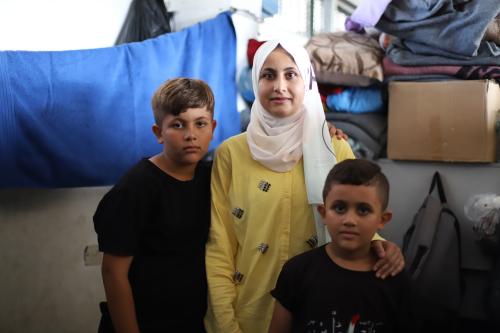
With as much as 85% of Gaza placed under so-called evacuation orders, people have been forced to live in ever more overcrowded and unhygienic conditions, where disease and illness are rife. Shurooq said her entire family fell ill as a result of conditions in the shelter, explaining: “All the children got gastroenteritis and the adults too…Water was not available; we did not know how to wash the clothes, or the bed covers that the children were vomiting on. The bathrooms were horrible, there was no privacy for women in the place. In the first few days [of being here], we did not eat anything because we did not want to go to the bathroom...because it was so dirty.”
Despite the immense hardships, Shurooq said there was a strong sense of solidarity between women in the shelter. “Palestinian women are known for being patient and strong and facing all these difficulties,” she said. “In the shelter, all the women here helped each other. For example...I did not know how to knead or bake...there was an aunt who would come and teach me: put the yeast like this, put the dough here, do this.” And when she suffered a third-degree burn on her foot after spilling tea from a kettle, Shurooq said: “The women helped me as I could not do all the work like washing and cooking.”
Dalia is one of the thousands of women in Gaza who has given birth over the last year while displaced and without access to adequate healthcare. After being forced to flee to Rafah from her home in northern Gaza while seven months pregnant, she gave birth in January while malnourished and fatigued. She said: ”It was incredibly cold; we were right in the midst of winter. I was unable to get clothes for myself or my newborn... No meat, fruits, or vegetables were available in the market.”
Dalia said the tent she and her baby are now living in is wholly inadequate and she is unable to get her baby the essentials she needs. She said:
”My baby is at the age when she should be starting to teethe and crawl. I can’t buy her pain relief for her teething. I can't provide her with enough food, especially since my breast milk is insufficient. I don’t have [milk] formula...It is unsafe for her to crawl on this floor.... there are all types of insects, as well as a lack of hygiene. We don’t have cleaning detergents...I just wish that the war would end now.“
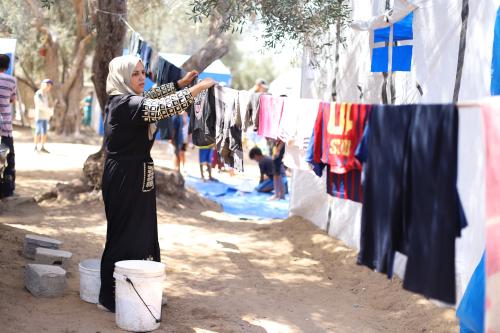
Almost the entire population is experiencing high levels of acute food insecurity, and there remains a high risk that famine could be declared. Nowhere near enough food, water, medicine, fuel and other aid is getting into Gaza, while aid operations on the ground are severely hampered by the constant danger, movement restrictions and a lack of fuel for transport.
Dr Fidaa is one of the many humanitarian workers in Gaza risking her life each day to support her fellow Palestinians. She lost her husband during an attack on an UNRWA shelter in May and is now the sole caregiver of her seven children, yet she continues to dedicate herself to her work. Dr Fidaa said:
“I face many challenges as a humanitarian worker. First, how to cope with my psychological [state]...and how to connect and how to interact with the outside world, how to upload the files [for] work and how to [illuminate] the tent during night. I use basic devices. I use a battery to continue my work, actually. And the other challenge for me, [is] how to reach the workplace...every day I use carts pulled by donkeys, and horses. This means of transportation makes the journey to the workplace difficult, uncomfortable and [it takes] a long time.”
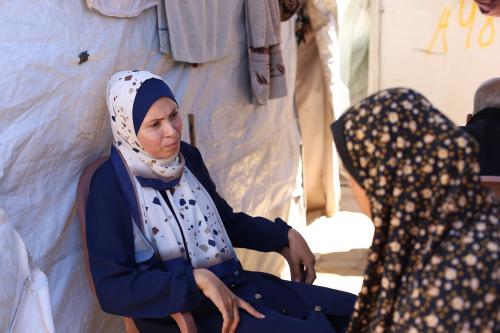
Dr Fidaa and her children have been displaced seven times and are now living in a flimsy tent, which she fears will not be suitable as the cold winter weather approaches. She said: “I think the tent will barely protect us from the outside environment. If the cold wind seeps inside the tent, I couldn't cover all my children here with suitable blankets and mattresses.”
Riham Jafari, advocacy and communications coordinator at ActionAid Palestine, said:
“It is impossible to comprehend how this crisis has dragged on for an entire year without a ceasefire being secured. For 12 months now, the world has failed the people of Gaza. We know from our work on the ground how women and girls are being particularly and acutely impacted by this nightmare, from being denied access to maternal healthcare and essential items like period products, to being more at risk from gender-based violence. Our dedicated staff and partners are working against the odds to support them, whether by distributing food, water, and hygiene kits, or running safe spaces for women and hotlines for reporting sexual or domestic violence. But the relentless attacks and blocking of life-saving aid is making their jobs almost impossible.
“As winter approaches, deaths from malnutrition and disease as well as the ceaseless Israeli military attacks will only increase. We demand an immediate and permanent ceasefire now, and for states to do everything in their power to secure one, including by halting arms sales to the Israeli government and imposing sanctions, such as travel bans and asset freezes. After 12 months of horror and trauma, there can be no more delay.”
We have spokespersons available for interviews. Contact the ActionAid press office on media-enquiries@actionaid.org or on +263776665065.
